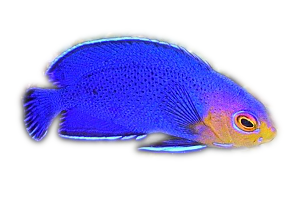
By Bob Goemans

Not Reef Tank Suitable
Likely Fish-Only Tank Suitable
Range: Western Pacific Ocean: Indonesia to Japan
Size: 9 inches (22 cm)
Natural Environment: Inhabits fairly shallow rocky reefs at depths between 3 - 100 feet (1 - 30 m) and is thought to feed mainly on sponges and tunicates.
General Husbandry: This beautiful angelfish, which is rarely available in the trade, has a tannish-orange face with greenish-blue stripes that extend backwards onto the remaining body, which becomes progressively darker brown to the tail, which is bright yellow.
If fortunate enough to acquire this species, it should be placed into a well-established fish-only aquarium with lots of live rock and cave areas and offered several daily feedings so as to quickly acclimate it to its surroundings.
As to diet in the wild, there does not seem to be any specific details, but nevertheless, because it's a fairly shallow water species, the same foods as for similar depth angelfish species should suffice, e.g., a wide variety of frozen foods including fortified brine shrimp, mysis, and especially those containing sponge matter/angelfish food preparations. Furthermore, there are reports that in aquariums this species is an excellent browser of filamentous algae, therefore flake foods, and especially those containing Spirulina and/or Nori should also be offered, with once or twice a day feedings after its acclimated highly recommended.
Depending upon its tankmates, it can be quite shy when first entering the aquarium, and may hide in caves and crevices. But as time passes, will become more outgoing and begin to establish its territory. Nevertheless, those in this genus, as those in the genus Apolemichthys, are almost always very good tankmates and considered one of the least aggressive in the family.
Depending upon a specimens origin, those from Southern Japan would possibly be best placed in water temperatures in the mid to higher 60’s, whereas those from Indonesia would be better placed near the higher portion of their temperature range.
Taxonomy:
Order: Perciformes
Suborder: Percoidei
Family: Pomacanthidae
Genus: Chaetodontoplus
FYI: Keeping more than one genus of angelfishes in the same aquarium is possible, yet depends upon several aspects. The following suggested circumstances are just that, possibilities that when heeded and adjusted to actual aquarium conditions ‘may’ make multiple angelfish collections feasible.
Aquarium size – the larger the better.
Other species from the same genus should not be in the same aquarium.
The smallest and most docile genus species should be the first introduced with the largest and most malicious the last to be added.
Do not place similar coloration species in the same aquarium.
Those already in the aquarium should be well fed before adding a newcomer.
Have sufficient hiding places/rocky caves.
Keep in mind all angels have cheekspines at the edge of their gill cover; therefore use caution when handling and also avoid using a net to capture it, as it may become stuck or tangled in the net and become damaged when removed.
Experience Level: Intermediate
Temperament: Semi-aggressive
Diet: Omnivore
Acclimation Time: 30 minutes+
Aquarium Environment: Fish-only aquarium
Reef Safe: No - will nip clam mantles, large and small polyped stony (LPS/SPS) corals and some soft corals.
Minimum Tank Size: 150 gallons
Temperature Range: 63 - 79°F (17 – 26°C)
Specific Gravity: 1.020 - 1.026
pH: 8.0 - 8.5
